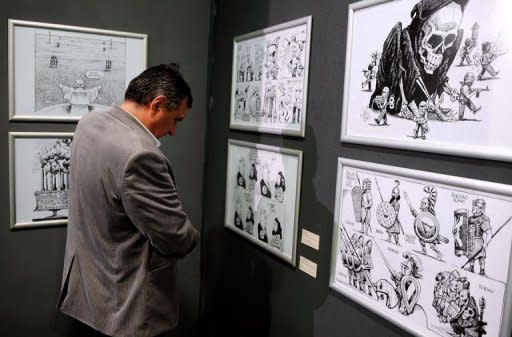Political cartoons on ' frontline of freedom': KAL
Political cartoons are "on the frontline of freedom" as recent attacks on cartoonists in Iran and Syria showed, famous American cartoonist Kevin KAL Kallaugher told AFP in Bucharest. The main reason is "because the job of a cartoonist is not to make you laugh but to make you think," said the man who has caricatured the most powerful people in the world, from US President Barack Obama to German Chancellor Angela Merkel to Russian leader Vladimir Putin. Kallaugher's satirical drawings for The Economist and US daily The Baltimore Sun are featured in an exhibition that opened this week at the National Museum of Contemporary Art in the Romanian capital. Ironically, the museum is located in the pharaonic palace built by former Romanian dictator Nicolae Ceausescu, a man who would not have tolerated any satirical cartoons. "There are many countries in the world today, emerging democracies like Romania, that are grappling with this notion of how much freedom to allow and how much to endure this special kind of criticism that satire cartoons could bring," said the cartoonist known as KAL who became in 1978 the first resident cartoonist of The Economist. Since then, he has drawn about 140 covers for the British weekly and a total of 7,000 political cartoons. "Last week, an Iranian cartoonist was sentenced to 25 lashes because he had drawn an Iranian politician as a football player," Kallaugher said. Amnesty International condemned the sentencing of cartoonist Mahmoud Shokrayi as an attack on freedom of expression, saying it sent "a chilling message to all Iranians". Kallaugher also pointed to the beating of Syria's best known satirical cartoonist Ali Ferzat last year. Since the start of the uprising against President Bashar al-Assad's regime in March 2011, Ferzat had published drawings critical of the brutal crackdown on protesters. "At the same time, in countries like India and Bangladesh, you see new freedom and new opportunities for cartoonists, so I have hope" for the future, Kallaugher said. But the temptation to limit the freedom of cartoonists can even be found in long established democracies. "Even in the US which prides itself for its democracy and freedom of speech, in the months that followed 9/11, there were a lot of people that would have been happy to censor those criticising voices," Kallaugher said. As Europe and the United States battle with the long-lasting effect of the economic crisis, cartoons that "capture the essence of what is really happening" are "crucial", Kallaugher believes. They also help people to understand complex issues like the debt crisis. But why do cartoons that are created to make you laugh at a situation have such an impact? "Caricature takes powerful people and brings them down a notch. It is truly a democratic form and you are telling these people that they are not doing their job," Kallaugher said. "Laughter is a lubricant in the brain to allow you to accept things that normally you would reject," he added. "It is like when you meet someone and they have their arms closed and crossed in front of you, you know they are not listening to what you have to say but when they open their arm, their heart is open." "Laughter does the same, it opens up the brain," he said.




